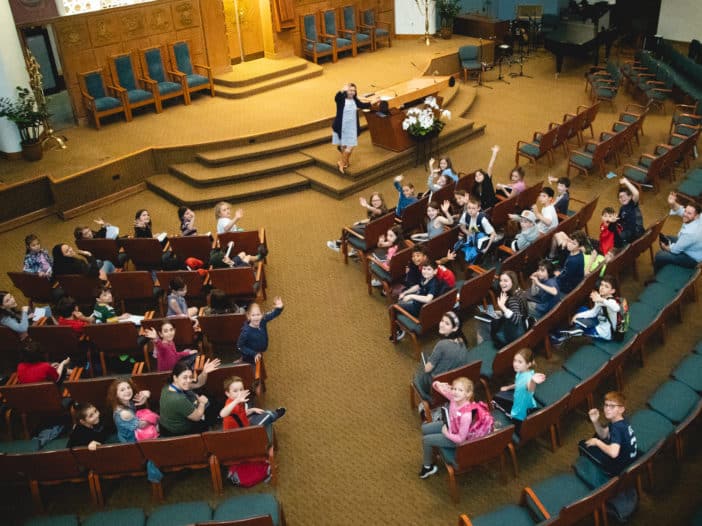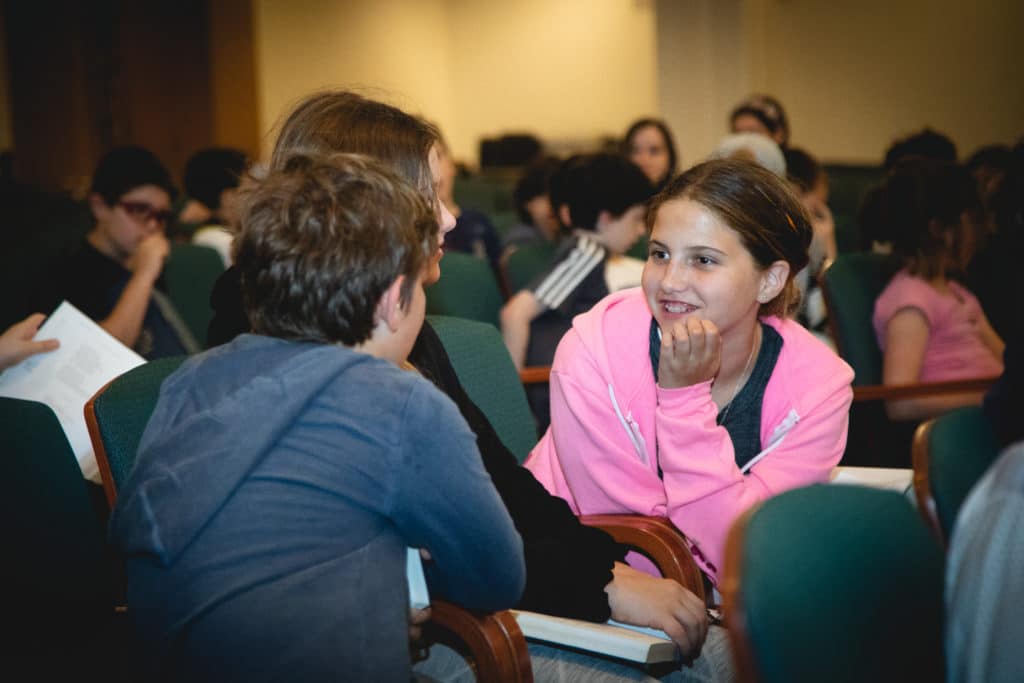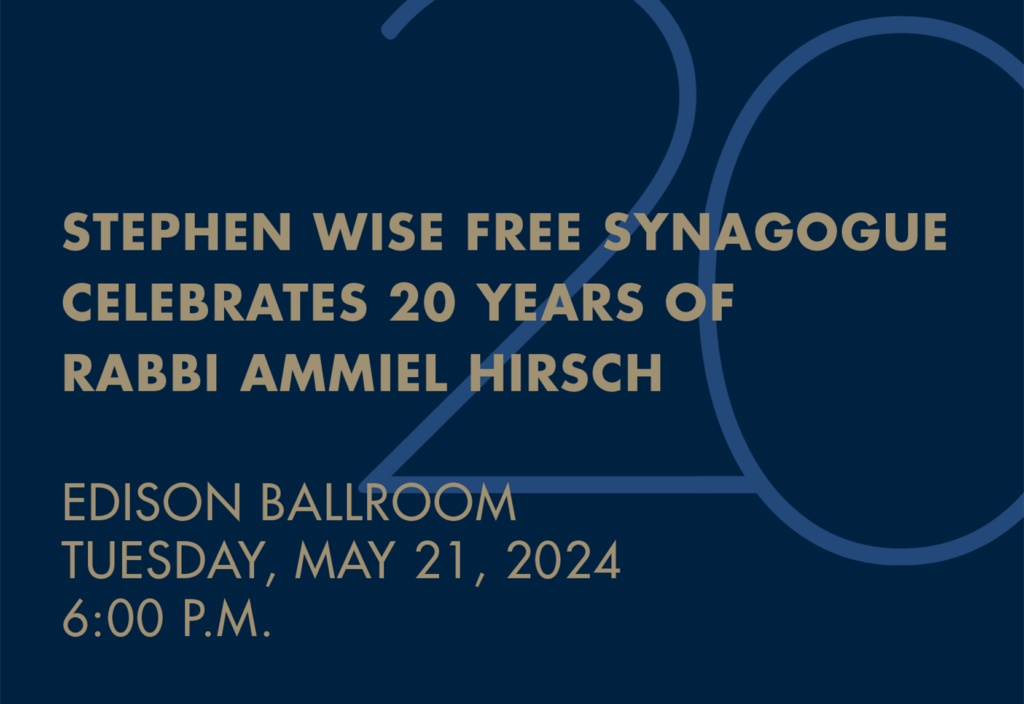
How do you build Jewish identity? That’s the question at the heart of Rabbi Rena Rifkin’s work at Stephen Wise Free Synagogue’s Religious School. And with the release of the Pew Research Center’s most recent survey of Jewish American adults, it’s been on the minds of quite a few Jewish educators.
Nearly a third of Jews no longer identify with the Jewish people at all, according to the survey, but nine out of ten Jews who were raised “Jewish by religion” are still Jewish today. That’s because “synagogues create a space that is holy and full of people who are Jewish like you,” says Rabbi Rifkin. “Here we pause and just do the Jewish thing — taking off the ‘American’ part of our identity and focusing on the’ Jewish’ part.”
Among those Pew surveyed who are not “traditionally observant,” about half say they take part in activities like cooking Jewish food, visiting Jewish sites when they travel or sharing Jewish culture or holidays with friends. “There are lots of ways to be a Jew,” Rabbi Rifkin says. “Jewish education is about helping people figure out who they are and how they want to be Jewish, or understand what being Jewish even means.”
It breaks Rabbi Rifkin’s heart when Jewish education stops at age 13. “I went to five years of rabbinical school and have a bachelor’s in Jewish studies — and even I don’t know everything! Identity development is cumulative and it doesn’t stop. You wouldn’t stop teaching math after seventh grade and you wouldn’t expect someone who skipped algebra to be able to do calculus.” When it comes to identity building, “it’s so important that our kids keep going. A massive amount of development happens in the teenage years — that’s when you start really discovering who you are.”
So what’s the best way to continue cultivating Jewishness after b’nai mitzvah? “Camp,” says Rabbi Rifkin in one word. She puts her money where her mouth is: she was interviewed for this article by phone from URJ Eisner Camp, where she’s spent 27 summers, including eight as a faculty member. This summer her children were there with her, enjoying Jewish and traditional camp activities, as were 21 other Stephen Wise kids enrolled at Eisner and other Union for Reform Judaism summer programs. “At Jewish camp, you accomplish what you never could in a synagogue. It’s an immersive experience — like learning a foreign language— where 99% of the people you interact with are Jewish and everyone’s living on ‘Jewish time,’ saying motzi and birkat hamazon before and after meals and observing Shabbat.”
At school, being Jewish can often be the thing that makes children different. And the Pew survey found that Jews who wear recognizably Jewish items are more likely to feel unsafe. “Being different can be good or it can be bad,” says Rabbi Rifkin. “But at Jewish camp, you don’t have to explain why you’re wearing a Jewish star. Before we’ve even said anything, we already have something in common. You can be you and I can be me and now the conversation isn’t ‘Why do you wear that?’ but rather, ‘Why do you wear a star while I wear a chai?’”
Like attending Jewish camp, visiting Israel can provide immersive Jewish experiences — and, according to Pew, 82% of Jews say caring about Israel is “essential” or “important” to what being Jewish means to them. “I wish I could persuade those of you who have not been to participate in this transformative, life-altering journey, because words fall short,” Rabbi Ammiel Hirsch says of Stephen Wise’s missions to Israel. “Classrooms are inadequate to teach Israel; what we accomplish in eight days in Israel, we cannot accomplish in eight years in New York.”
That said, Rabbi Rifkin is working with our Rabbi Shira Gluck to expand our programming for teenagers. “We have lots of ideas, but we are most excited to work with the teens” — emphasis on “with” — “to plan events according to what interests them,” says Rabbi Gluck. “The best way to engage teens is to take them seriously. We’ll be hosting a monthly speaker series on topics like Judaism and environmental sustainability, food insecurity, gender identity, and local government. We are also planning a number of social events, especially around Shabbat and holidays, and we’re excited about the return of teen trips!”
Rabbi Rifkin notes that volunteering as madrichim in our Religious School classrooms is also a great way to stay involved in Jewish education, as is teen text study. Rabbi Gluck explains that “studying Torah with teens is especially rewarding because they are so creative. It’s such a joy to see how their minds and hearts open when they’re invited to interpret our sacred texts and find their own connections.” She adds: “There are so many ways to engage in Jewish life, be it text, language, ritual, food, music, activism — the possibilities are limitless and every person can find their way in. We’re here to help our people gain a sense of ownership and belonging.”
At the end of the day, “it’s a choice,” says Rabbi Rifkin. “If you want to fight antisemitism, change the world, feel connected to our heritage, and raise a Jewish family, you have to commit.” Her challenge to parents: find new ways to engage this year to be a Jewish role model for your children. “Pick one thing you’ve never done before,” she suggests. “Is it coming to Shabbat services once a month? The Emergency Food Program? Torah study? Pick one thing and try it. You’ll get out what you put in.”
Photos by Elizabeth Mealey, Shane Potter, and Elizabeth Mealey.





